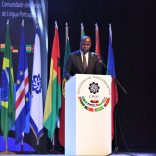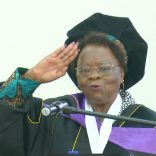III Session of the Sectoral Political Dialogue on Human Rights between the Government of the ...
Mozambique: Mondlane submits draft law lowering age of majority to 18

FILE - For illustration purposes only. [File photo: Lusa]
Politician and former presidential candidate Venâncio Mondlane proposed changes to Mozambican legislation this Tuesday, lowering the age of civil majority from the current 21 to 18 years, arguing that the new legal provision will make doing business more flexible for young people.
“This is due to the evolution of society as a whole, and as a rule, almost everywhere in the world, at the age of 18, young people begin their working lives for others, get married, vote, are elected, fulfil their military/patriotic obligations, and assume most of their responsibilities,” reads the justification of his draft bill on the age of civil majority, which he submitted this Tuesday to the Assembly of the Republic, signing the proposal as a member of the Council of State.
Mozambican legislation defines 21 years as the age of majority, a legal system classified by Mondlane as “retrograde”, especially in comparison with the countries of the Southern African Development Community (SADC) which, according to the politician, have already set the age at 18.
In the justification for the proposed law, the politician states that it aims to make it easier for young people to enter into certain businesses from the age of 18, which, under current legislation, they can only do from the age of 21, delaying their empowerment.
“Mozambique, being a predominantly young country, makes no sense for it to be out of step with the community of nations and the globalisation of commercial transactions involving goods, especially real estate, whose legislation allows, as a rule, those who are of legal age to carry out this type of business,” reads the preliminary draft law.
Using the same grounds as the proposed law on the age of majority, Venâncio Mondlane asks the Mozambican government to “stop putting obstacles in the lives of young people when they reach the age of 18”, and therefore advocates its debate and approval by parliament, pointing out that it will not have any impact on this year’s State Budget.
Mondlane, who does not recognise the results of the general elections held on 9 October, was the second most-voted-for presidential candidate in the results announced by the Constitutional Council, and therefore, as provided for in the Constitution, he has a seat in the Council of State.
The Mozambican Constitution defines the Council of State as a “political body for consultation with the President”, who presides over it, and which includes by nature the President of the Assembly of the Republic, the Prime Minister, the President of the Constitutional Council, the Ombudsman, former Presidents of the Republic and former Speakers of Parliament.
“The members of the Council of State shall enjoy privileges, immunities and protocolary treatment to be established by law,” the Constitution also establishes.
The Council of State is responsible for “advising the President (…) whenever he so requests”, but also for “obligatory pronouncements” on the dissolution of the Assembly of the Republic, declaration of war, a state of siege or a state of emergency, the holding of a referendum, the calling of general elections and the dismissal of provincial governors and district administrators.
Mondlane led the most serious challenge to the election results since the first multi-party elections (1994), with protests in which around 400 people lost their lives due to clashes with the police.
Almost a thousand Mozambican companies were affected by the post-election protests, with an impact on the economy of over €480 million and costing 17,000 people their jobs, according to estimates by the Confederation of Economic Associations (CTA).












Leave a Reply
Be the First to Comment!
You must be logged in to post a comment.
You must be logged in to post a comment.